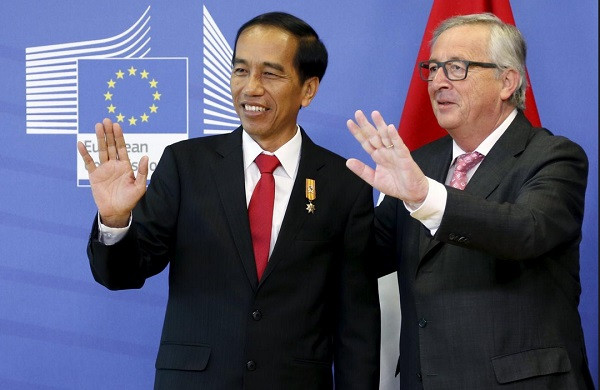Popular Reads
Top Results
Can't find what you're looking for?
View all search resultsPopular Reads
Top Results
Can't find what you're looking for?
View all search resultsUnlocking the potential of Indonesia-EU CEPA
It is little surprising that the EU's commitment to realizing the green deal has been met with skepticism, as some perceive these measures as neglecting the realities faced by nations like Indonesia, where the agricultural sector employs millions of farmers.
Change text size
Gift Premium Articles
to Anyone
 Long negotiations: President Joko “Jokowi” Widodo (left) and European Commission President Jean-Claude Juncker wave to the media prior to their meeting at the EU Commission headquarters in Brussels on April 21, 2016. Indonesia and EU are seeking to complete their comprehensive partnership agreement negotiation. (Reuters/Francois Lenoir)
Long negotiations: President Joko “Jokowi” Widodo (left) and European Commission President Jean-Claude Juncker wave to the media prior to their meeting at the EU Commission headquarters in Brussels on April 21, 2016. Indonesia and EU are seeking to complete their comprehensive partnership agreement negotiation. (Reuters/Francois Lenoir)
A
s a member of the European Parliament, I have fought tirelessly over the past years to embed sustainable development principles in EU Trade Partnerships. It is my firm belief that such agreements will bring about numerous benefits for both partners.
This is also of vital importance to me for the Indonesia-EU Comprehensive Economic Partnership Agreement (I-EU CEPA). The partnership between Indonesia and the European Union should enable us to deepen our relations.
Since 2016, negotiations for the I-EU CEPA have been underway, signaling a significant step forward in enhancing economic relations between our nations. Throughout this process, I have been impressed by the dedication and perseverance displayed by the negotiation teams from both the EU and Indonesia. Together, they have worked diligently to overcome challenges and forge a stronger bond between our nations. This collaboration is vital for several reasons, which I will outline below.
First, at the international level, the world has moved beyond the outdated notion that market liberalization alone guarantees sustainable growth. The Washington Consensus, rooted in a neoliberal agenda, has given way to a more nuanced understanding of the complexities involved. Recognizing this paradigm shift, the EU approaches CEPAs with a tailored approach that emphasizes economic growth with sustainability, fostering added value and possibilities for sustainable development in partner countries.
This agreement serves as a powerful demonstration against the rising tendencies of fragmentation and unilateral decision-making. In an era marked by paradoxical globalization, where digital connectivity brings us closer together while unilateral actions threaten collaboration, our partnership sends a clear message. By acting together, the EU and Indonesia can showcase the benefits of cooperation, serving as a role model for others and fostering greater global harmony.
Second, this agreement holds tremendous potential to benefit both parties economically. Indonesia's remarkable journey since gaining independence has seen significant progress. The nation as a whole has made significant strides in building strength and reliability to confront common challenges.
However, to continue this success story, Indonesia requires a fair CEPA that ensures it receives at least as many benefits as the EU. It offers an opportunity for Indonesia to further stimulate capacity building and added value to propel its economy forward. For this after the agreement has entered into force, I believe it is useful creating incentives, to motivate business to purchasing raw materials processed within Indonesia.
As a nation that has made remarkable strides since gaining independence, Indonesia deserves a CEPA that ensures great benefit. It is only fair that we provide Indonesia with the tools and support it needs to continue its success story. Through a CEPA, Indonesia can further strengthen its position as an influential global leader and a reliable partner in addressing common challenges.
While some may harbor doubts about the advantages of deeper trade relations with the EU, particularly in light of our intensified focus on sustainability, I am keenly aware of the concerns voiced by countries like Indonesia. It is a valid observation that we have benefited from early industrialization and have accumulated wealth also through historical interactions with formerly colonized nations. Greater understanding and patience is needed from us Europeans for this historical fact, when thinking about current problems.
Against this background it is little surprising that the EU's commitment to realizing the green deal has been met with skepticism, as some perceive these measures as neglecting the realities faced by nations like Indonesia, where the agricultural sector employs millions of farmers. This is why I find it of great importance to highlight smallholders are of vital importance to me. I believe that we can work together on mechanisms ensuring that we reach common goals regarding deforestation.
Projects such as the NES Ophir Plantation, supporting smallholders in setting up oil plantation, point in the right direction. The Indonesian proverb "Di mana ada kemauan, di situ ada jalan" (Where there's a will, there's a way) resonates with me. I am committed to working together to ensure that this agreement not only fosters sustainability but also enables inclusive economic growth for all Indonesians.
In recent years, the EU has evolved its approach to CEPAs, as exemplified by our agreement with Chile. We have recognized the significance of tailoring agreements to foster sustainable economic growth, with an emphasis on added value for our partner countries and dialogue for sustainable development. Vietnam, for instance, has reaped significant economic benefits through its CEPA with the EU.
We have reopened trade talks with Thailand, and other countries in the region, including the Philippines and hopefully Malaysia, may soon follow suit. The EU-Indonesia CEPA can position Indonesia favorably in this competition, bolstering its economic growth and ensuring its active participation in the region's development. It is important to note that EU CEPAs taking into account the development levels of partner countries and mostly grant initial advantages to the developing trade partner.
In line with this, I wish to see a broader presence of Indonesian products in the European market, including the rich array of spices and enjoyable Indonesian dishes. It is astounding that European consumers can find Thai and Vietnamese products so easily, and struggle to find Indonesian culinary delights like Nasi Rendang. Indonesia boasts a vibrant culinary tradition and a wealth of offerings that deserve greater recognition and appreciation in Europe.
In conclusion, the EU-Indonesia Comprehensive Economic Partnership Agreement carries immense potential for both parties. This partnership symbolizes the EU's commitment to fostering sustainable development, respecting national sovereignty, and acknowledging the challenges faced by developing countries. By embracing this agreement, we can counter fragmentation tendencies, strengthen our economies, promote sustainability, and empower Indonesia to further flourish in the ASEAN region.
Let us embark on this journey together, cultivating a lasting friendship based on understanding, cooperation and prosperity.
***
The writer is a member of the European Parliament and the chair of the European Parliament’s Committee on International Trade (INTA).










